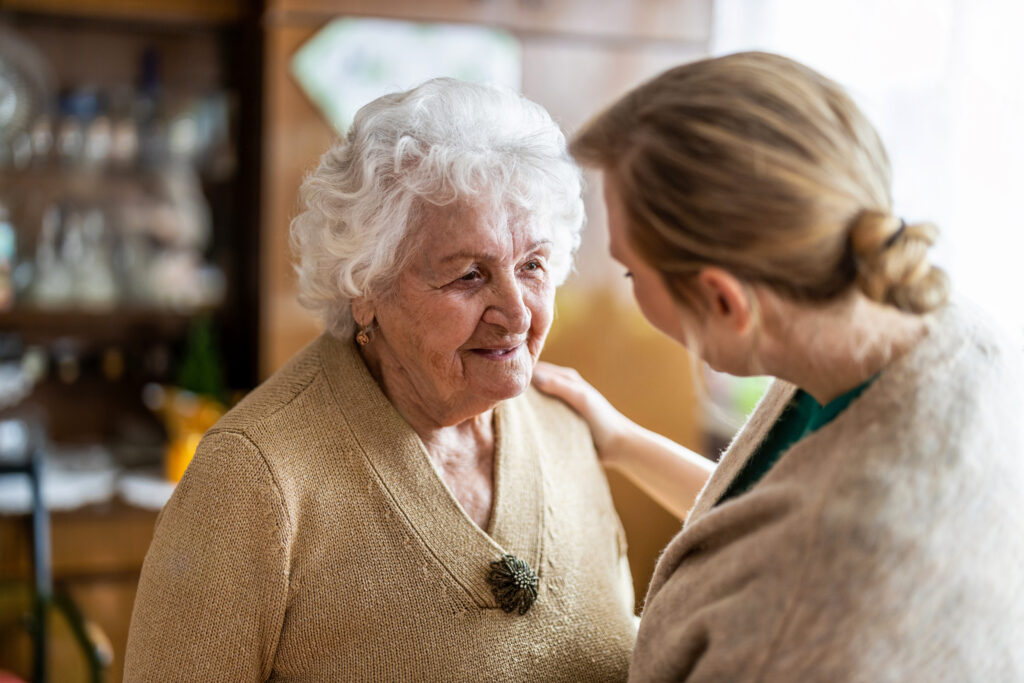Home health in South Carolina
Home health services are unique in comparison with other forms of care. A physician orders the services, and is typically provided after a hospital stay or a skilled rehab stay. The patient may resume normal function around the house after they’ve recovered. Not all health services require around the clock care. Sometimes a loved one may only need help a few days a week.
South Carolina is considered a good state to live and retire in. The climate is mild; the cities and counties affordable. In a recent survey, the state was made out to be the fourth best place to live for senior citizens.
- Home health in South Carolina
- The home health team – dedicated to specialized care
- Who licenses home health in South Carolina?
- Additional Resources
- Definitions of types of care
- How to pay for Home Health and available coverage
- Questions to ask when looking for Home Health
- Search other areas for Home Health
Home Health is not Home Care
Home care professionals assist with activities of daily living (ADLs). These in-home aides may assist with personal care and health monitoring, similar to the care an individual would receive in a long-term facility or community, in the comfort of their own home.
If you are looking for care for yourself or a loved, there are several other types and levels of care aside from home health:
Definitions of types of care
Home Care: Caregiver assistance related to activities of daily living, including: mobility, eating, toileting, bathing and personal hygiene, dressing and grooming or cognition support. These services are typically not covered by medical insurance and do not require a physician’s order.
Home Health: includes skilled nursing services, physical therapy, occupational therapy, speech language therapy and medical social services. A home health care agency may choose to be Medicare certified to be reimbursed for their services. Home health agencies may also teach you how to care for yourself. Services ordered by a physician, covered by Medical Insurance and typically provided following a hospital or skilled rehab stay.
Rehabilitation & Therapy: treatment for an injury, illness, or pain with the goal of restoring function, including nursing and therapy services. Rehab is ordered by
a physician and services are provided by nurses and physical, occupational, and speech therapists. Examples include working with a physical therapist to help you walk and with an occupational therapist to help you get dressed.
Respite Care: short term relief for family caregivers to take a break from the caregiving responsibilities and allows for a healthier and better quality of life for both the caregiver and care receiver. Respite services include: companionship, personal care, recreational activities and security. Respite care can be provided as short stay or for a longer period that allows the family caregiver to go on vacation or a business trip. Longer duration respite care is generally found at select senior housing communities although some Companion services may provide this service in the home.
Hospice Care (Palliative Care): emphasizes comfort measures and counseling to provide social, spiritual and physical support to the dying patient and his or her family. The goals of hospice are to keep the patient as comfortable as possible by relieving pain and other symptoms. Hospice care, is typically offered in the last six months of life and covered under Medicare Part A .
The home health team – dedicated to specialized care
The home health team consists of:
- Physicians
- Nurses
- Home health aides
- Certified nursing assistants
- Physical therapists
- Occupational therapists

Home health differs from these other services in its approach to care
This level of care is designed for individuals who are ill with a chronic condition and assists in recovery after surgery and other acute health conditions. Home health allows a patient to discharge from the hospital earlier and reduce future hospital admissions. Home health is there to assist in faster recovery.
Trained home health professionals offer a litany of health services

- Injections
- IV transfusion
- Diabetes management
- Catheter care
- Tracheotomy care
- Post-op rehabilitation
Typically, visits scheduled a few times a week with different disciplines of the home health team.
Who licenses home health in South Carolina?
The South Carolina Department of Health and Environmental Control licenses all home health agencies in South Carolina. Regulation 61-78 covers all guidelines for home health in the state.
Federally, icensing and certifications for Home health agencies must be in compliance with state and local standards. Medicare Part B and the Hospital Insurance Act cover home health services. In order to receive Medicaid and Medicare, agencies must meet certain standards set out by the Centers for Medicare and Medicaid Services (CMS). A physician and qualified nurses oversee the skilled nurses and the other home health professionals.
How to pay for Home Health and available coverage

Medicare:
Generally Medicare reimburses the cost of Home health services. Medicare typically covers your loved one when recovering from an illness or an accident or a surgery.
*Medicare covers the specific ailment. When treatment is completed Medicare coverage stops.
Medicare is not a long-term care solution.
Medicaid:
Medicaid programs are put in place on a state-by-state basis. Each state will have their own regulations regarding the coverage of care. Some individuals at a certain low-income level may qualify for Medicaid Home and Community Based Service Waivers.
Veteran Aid and Attendance:
This benefit is available to some military veterans or surviving spouses.
- A veteran may qualify for as much as $2,050 each month.
- A veteran with a sick spouse may be eligible for $1,600 per month.
- If a veteran has passed, their surviving spouse can qualify for $1,300 per month.
Private Insurance:
- Most health insurance companies typically cover some services for acute medical needs.
- Do be aware, long-term coverage vary by plan. Not all long-term insurance will assist with home health services as the needs of the person tend to be temporary.
Private pay:
Families which can afford to do so may pay for care with private funds. Private pay can be a combination of retirement funds, personal savings, pension payments and family members may contribute funds toward a loved one’s care as well.
Questions to ask when looking for Home Health
- How long has the agency been serving this community?
- Does the agency have any printed brochures describing the services it offers and how much they cost?
- Is the agency an approved Medicare provider?
- Is the agency currently licensed to practice (if required in the state where you live)?
- Does a national accrediting body certify the quality of care?
- Does the agency offer seniors a “Patients’ Bill of Rights” that describes the rights and responsibilities of both the agency and the senior being cared for?
- Is there a care plan in place that outline the patient’s course of treatment, describing the specific tasks to be performed by each caregiver?
- How closely do supervisors oversee care to ensure quality?
- Will agency caregivers keep family members informed about the kind of care their loved one is getting?
- Are agency staff members available around the clock, seven days a week, if necessary?
- Does the agency have a nursing supervisor available to provide on-call assistance 24 hours a day?
- How does the agency ensure patient confidentiality?
- How are agency caregivers hired and trained?
- What is the procedure for resolving problems when they occur?
- How does the agency handle billing?
- Is there a sliding fee schedule based on ability to pay, and is financial assistance available to pay for services?
- Will the agency provide a list of references for its caregivers?
- Who does the agency call if the home health care worker cannot come when scheduled?
- What type of employee screening is done?
Resources and Links- California
Area Agencies on Aging The California Department of Aging (CDA) administers programs that serve older adults, adults with disabilities, family caregivers, and residents in long-term care facilities throughout the State. These services are provided locally by contracted agencies. This webpage is intended for those who provide, or seek to provide a variety of aging services.
The Home Care Services Bureau is responsible for licensing Home Care Organizations including processing applications, receiving and responding to complaints and conducting unannounced visits to ensure compliance.
California Department of Aging Under the umbrella of the California Health and Human Services Agency, the California Department of Aging (CDA) administers programs that serve older adults, adults with disabilities, family caregivers, and residents in long-term care facilities throughout the State. These programs are funded through the federal Older Americans Act, the Older Californians Act, and through the Medi-Cal program.
California Rural Indian Health Board The Pit River Tribe of California’s Rancherias in the operating area are as follows: * Montgomery Creek Rancheria * Roaring Creek Rancheria * Burney * Lookout Rancheria * XL Ranch Rancheria * Likely Rancheria * Big Bend Rancheria The main site, Burney Indian Health Clinic, in Burney, CA offers full time health care in many fields. As a service to the community the Shasta County W.I.C. Program is also located at the site in Burney. A satellite office, the XL Ranch Reservation Clinic, is located in Alturas, CA (Modoc County) providing referral and outreach services. The principal referral facility is Mercy Medical Center Hospital in Redding, CA which approximately miles from the main clinic site. This facility offers general medicine with 169 medical/surgical, 14 ICU, 14 CCU, 19 Pedriatrics, 29 Perinatal, 5 Acute/Respiratory and 6 ICCN beds
Eldercare Locator This is a great resource to search for specific care in specific counties and cities. This database is a nationwide resource that connects older Americans and their caregivers with trustworthy local support resources. Connect with services such as meals, home care or transportation, or a caregiver education or respite from caregiving responsibilities. The Eldercare Locator is a public service of the Administration on Aging (AoA), an agency of the U.S. Administration for Community Living.
Medicare provides a search feature to find & compare providers near you, most senior housing and care providers are included on CareAvailability.com. Find & compare plans in your area. Determine if you qualify for premium savings
Medicaid offers information on how to apply for Medicaid, eligibility criteria, links to local state offices, and additional resources.
The Alzheimer’s Association is the leading voluntary health organization in Alzheimer’s care, support and research. Whether you are living with Alzheimer’s or caring for someone with the disease, information and resources are available.
The Center for Medicare & Medicaid serves the public as a trusted partner and steward, dedicated to advancing health equity, expanding coverage, and improving health outcomes.
Additional Resources
This link is the source for all things related to Medicare & Medicaid.
A great source to learn more about Medicare and Medicaid coverage.
This video link explains all you need to know about Medicare coverage of home health services.
Retirement Connection is a great place to learn the differences between Home Health and other services.
DHEC in South Carolina
